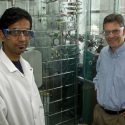NSF funds UW sustainability project studying the human component of green buildings
Designing a “green” building involves considering a multitude of variables — everything from electrical efficiency to airflow controls to natural sources of light, heat and energy. But engineering more efficient building control systems is only part of the picture; for a building to be truly green, the occupants living and working within it need to know how to behave in a sustainable way as well.

UW-Madison researchers will study how human behavior can be affected to improve the performance of green building features, such as this programmable thermostat.
“There are many who say the sustainability problem is not technical. It’s cultural,” says Giri Venkataramanan, a professor of electrical and computer engineering at the University of Wisconsin–Madison. “How do we bring the technology and the culture together to enable change?”
Thanks to $1.9 million in support from the National Science Foundation, an interdisciplinary team of researchers from UW–Madison and the Rensselaer Polytechnic Institute will get a chance to answer that question. They will investigate a holistic concept for future green buildings by researching ways to combine multiple dimensions of building control systems with analysis of how human beings factor into making a building energy efficient.
Suman Banerjee, a UW–Madison professor of computer sciences and electrical and computer engineering, says investigating green building systems in isolation ultimately is ineffective, since the net impact those systems can have in reducing energy waste will be determined by the people who use them. “We need to think about how we engage the user to understand how they will leverage the technology that we propose,” says Banerjee.
And researchers don’t typically think of human beings as part of a control loop in an electrical system. “We do a lot of modeling of electrical systems, how to design controllers, but with this or any level of human involvement, I don’t think we know how to set the problem from a systemic perspective, and I believe that will come out of this,” says Venkataramanan.
“Sustainability is as much about people making choices about the way they live their life as it is about the technology we can create to save energy and decrease emissions. People have to think differently about how they live their lives, and this project is at the center of that.”
Craig Benson
The National Science Foundation funded the project through its Sustainable Energy Pathways program, which supports sustainable energy research that places a high emphasis on innovation and cooperation between engineering and the social sciences. In addition to Banerjee and Venkataramanan, the UW–Madison team includes Carol Menassa, the M. A. Mortenson Company Assistant Professor of Civil and Environmental Engineering, who will investigate more effective occupancy detection systems, and Nancy Wong, an associate professor of consumer science.
Wong will categorize different types of climate consumers and develop baseline profiles of occupant behavior. She will use those profiles to design and test different methods of conveying climate control information in a way that offers feedback to occupants when they adjust the temperature or flip a light switch.
“I think we are approaching this project differently in that energy use patterns are more habitual in nature,” says Wong. “It’s more promising to combine education with other behavioral prompts, design changes to ‘nudge’ people in the right directions and help them develop energy-saving habits so they won’t have to think about it.”
Wong’s work will be pivotal in designing more comprehensive feedback for building occupants and, moreover, in helping the other members of her team design systems that reinforce responsible energy use. “Giving people feedback on the impact, giving them an understanding of their actions, will allow people to act on that information and provide more useful feedback to the system as a whole,” says Banerjee.
The project is also one of the first major collaborations coordinated through the UW–Madison Office of Sustainability, whose strength in assembling teams across departments and colleges to collaborate on sustainability made the office an ideal home for the project.
“One of the objectives of our office is to create bridges between the research enterprises across the campus, to bring people together from different colleges and different areas, not only in the research environment, but to make it actionable in the real campus living and working environments,” says Craig Benson, director of the Office of Sustainability.
“Sustainability is as much about people making choices about the way they live their life as it is about the technology we can create to save energy and decrease emissions. People have to think differently about how they live their lives, and this project is at the center of that,” Benson says.
Venkataramanan says the project is a great step forward in the mission the office set out to achieve. “There are a lot of dreamers on campus, but it’s sometimes hard to establish a concrete program on things related to sustainability. We’re hoping that this works as a pilot,” he says.


